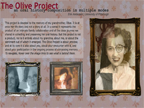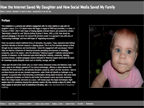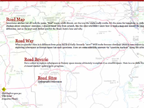Memory, Family, Composition
15.2 Spring 2011
-
Topoi
-
The Olive Project: An Oral History Project in Multiple Modes
Erin R. Anderson

This project is devoted to the memory of my grandmother, Olive. It is at once her life story and not a story at all. In a sense it represents the product of an intimate family collaboration and of the close journey we shared in collecting and preserving her oral history. But this project is not a product, nor is it entirely about my grandma, about me, or about the sentiment out of which it emerged. The Olive Project is about process, and at its core it is also about you, about your encounter with it, and about your participation in the ongoing process of composing memory.
-
Techno-velcro to Techno-memoria: Technology, Rhetoric, and Family in the Composition Classroom
Patricia Freitag Ericsson & Paul Muhlhauser

"Techno-velcro to Techno-memoria" is an intergenerational collection of techno-memories illustrating the impact of techo-literacies on family communication practices. Guests participating in "Techno-velcro to Techno-memoria" add their voices to create a rich resource of techo-rhetorical connections. Our guest-collaborators remember and describe moments where family, technology, and rhetoric have mixed in their lives.
-
How the Internet Saved My Daughter and How Social Media Saved My Family
Marc C. Santos

This installation is a personal and cathartic engagement with my initial inability to cope with my daughter's cancer. It details events that began in August of 2008 and concluded, in a sense, in February of 2009. I offer it with hopes of helping digitally oriented rhetoric and composition scholars "determin[e] a should for a we" (Patricia Sullivan & James E. Porter, 1997, p. 103). How should we approach pedagogy in the early 21st century? My tentative answer is to approach it less with aims of "constructing knowledge" and more with hopes of "negotiating encounters."
-
-
Praxis
-
Road Trip: A Writer's Exploration of Cyberspace as Literary Space
Lynda Rutledge Stephenson

The fact that I'm not a professor of professional writing or computer design allows for "Road Trip," with its basic code creation, to be of pedagogical use for students and teachers with limited technological resources. Through a scholarly engagement with creative writing, electronic literature, and design, this writing experiment is an example of the fun that a little, simple creative writing/coding can be for the creative writer.
-
PraxisWiki: Interaction of Author, Audience, and Purpose in Multimodal Texts: Students' Discovery of Their Role as Composer
Beth Powell, Kara Poe Alexander, Sonya Borton
-
PraxisWiki: MySpace, Facebook, and Multimodal Literacy in the Writing Classroom
Jennifer Swartz
-
Interviews
-
Becoming Book-Like: Bob Stein and the Future of the Book
Matthew K. Gold
-
Index: All Kairos Interviews
Reviews
-
MicroReviews :: Bibliography Builders: On the Web and Ready to Use
Nick Carbone
The Microreview feature is intended to present a series of condensed reviews of online work by an invited scholar. By providing an informed perspective chosen by the reviewer, readers can not only find out about this type of online work, but begin to understand how the online work may be relevant to their own scholarly and teaching practices.
-
Review of Teaching Multiwriting: Researching and Composing with Multiple Genres, Media, Disciplines, and Culture by Robert L. Davis & Mark F. Shadle
Brittany B. Cottrill
-
Review of Digital Culture, Play, and Identity: A World of Warcraft® Reader edited by Hilde G. Corneliussen & Jill Walker Rettberg
Angela Harrison
-
Review of Who Owns School? Authority, Students, and Online Discourse by Kelly Ritter
Rita Malenczyk
-
Review of Writing and the Digital Generation: Essays on New Media Rhetoric edited by Heather Urbanski
Danielle Roney Roach
-
Index: All Kairos Reviews

